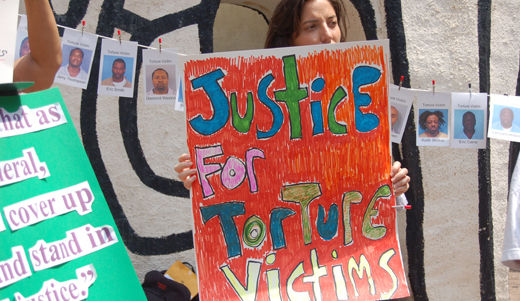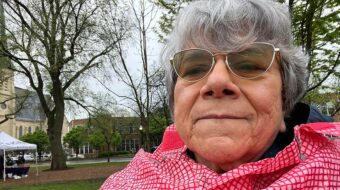
CHICAGO (AP) – Victims of police torture under former Chicago Police Commander Jon Burge would share $5.5 million, receive an apology and see their story taught in school under a reparations package proposed Tuesday that city leaders hope will help close one of the most shameful chapters in Chicago’s history.
More than 100 people who have accused Burge and officers under his command of shocking them with cattle prods, beating them with phone books and suffocating them with bags until they gave false confessions over nearly two decades ending in 1991. While some have already settled for thousands or millions of dollars, the dozens left can each receive up to $100,000 under the proposed ordinance. The proposal is scheduled to be introduced Wednesday and is widely expected to pass when it returns to the council next month for a vote.
“My goal is to both close this book – the Burge book – on the city’s history, close it and bring closure for the victims and make sure that we take this as a city and learn from it about what we have to do going forward because a police department is about public safety, community policing and building trust,” Mayor Rahm Emanuel said.
Amnesty International USA applauded the proposal, which it said was unlike anything a U.S. municipality has ever crafted. “Calling it ‘reparations’ is itself momentous, and the spectrum of what is being presented – restitution, compensation and rehabilitation – is unprecedented,” said Jasmine Heiss, a senior campaigner for the organization.
The $5.5 million adds yet more money to more than $100 million that has been paid in court-ordered judgments, settlements of lawsuits and legal fees – most of it spent by the financially strapped city of Chicago and some by Cook County – over the years. And while the $100,000 maximum payment per victim is a fraction of some previous settlements, an alderman who co-sponsored the ordinance said for many victims this was the best they could hope for.
“While it is not perfect, it is a form of closure that each person would be able to get $100,000 and that is a meaningful settlement,” said Howard Brookins, chairman of the council’s black caucus, who proposed several months ago that a $20 million fund be set up for torture victims.
Attorney Joey Mogul, of the People’s Law Office and co-founder of the Chicago Torture Justice Memorials, said the “historic” settlement is a compromise that “takes into account” the city’s difficult financial situation.
At the same time, the city took steps to make sure what Burge and his infamous “midnight crew” did to suspects – most of them African-American – to extract confessions is not forgotten.
Besides a provision that calls for teaching about the Burge torture cases to 8th graders and 10th graders in public school history classes, the ordinance would include a formal apology from the City Council, psychological counseling and other benefits such as free tuition at city community colleges. And in recognition that the torture, and in many cases wrongful convictions and lengthy prison sentences, affected both the victims and their families, the e ordinance would extend some benefits to victims’ children or grandchildren.
Darrell Cannon – who told of having a shotgun shoved in his mouth and having his genitals shocked by a cattle prod by Burge’s men to confess to a killing he did not commit – said while the amount he would receive under the settlement is not nearly enough, he was proud of being a part of history.
“For those of us who have been fighting and struggling to set a landmark, this is that landmark,” said Cannon, who was freed after 24 years in prison when a review board determined that evidence against him was tainted. “This is the moment. What we do here will not be undone. People across the country will talk about Chicago.”
Burge, 67, was fired from the Chicago Police Department in 1993. He was never criminally charged with torture, but was convicted in 2010 of lying about torture in a civil case and served 4 ½ years in federal custody. Still drawing his pension, he was released from a Florida halfway house in February.
Associated Press writer Sophia Tareen in Chicago contributed to this report.
Photo: Pepe Lozano/PW











